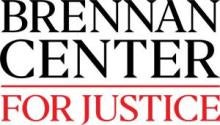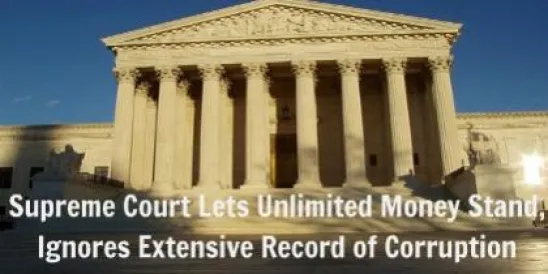Brennan Center Submitted Amicus Brief Urging Court to Uphold Montana Election Law, Revisit Citizens United
Washington, D.C.– The U.S. Supreme Court today, June 25, 2012, by a 5-4 vote, struck down Montana’s 100-year-old ban on corporate election spending — without even allowing full briefing or argument in the case. The decision reverses a Montana Supreme Court decision, which upheld the law due to the state’s dramatic history of corruption.
In May, the Brennan Center submitted a friend-of-the-court brief urging the Court to uphold the law, and use the case to revisit the disastrous Citizens United ruling, which opened the door to unlimited spending in American elections. The brief, submitted on behalf of the Center and nine constitutional law professors in American Tradition Partnership v. Bullock, argued that Citizens United is untenable in light of the dominant role now being played in U.S. elections by super PACs and other outside groups.
“The 2012 elections make one thing clear: unlimited spending by super PACs and secretive nonprofits is corrupting our political process and threatens to swamp our democracy,” said Adam Skaggs, senior counsel in the Brennan Center’s Democracy Program. “Increasing numbers of Americans believe our government is bought and paid for by special interests and that their votes don’t matter. By not taking this case, the Court missed a critical opportunity to rein in some of the worst excesses of Citizens United, and other rulings, that created this super PAC mess.”
Montana banned corporate election spending for more than 100 years as a result of a dramatic history of efforts by big companies to capture the state government. The state of Montana compiled an extensive and powerful factual record that demonstrated how unlimited corporate spending previously held the state hostage to mining companies and still poses severe threats to Montana’s elections and government. For the Court to strike down the state’s anti-corruption law without even reviewing that record is a serious mistake.
By reversing the Montana court and not hearing the case, the Supreme Court also ensures that super PACs and other outside groups will continue to play a dominant role in U.S. elections.
In Citizens United, the Court said that, based on the facts before it, “independent expenditures, including those made by corporations, do not give rise to corruption or the appearance of corruption.” Lower courts extended this decision, reasoning that if outside spending cannot lead to corruption, then there is no legitimate basis for restricting how much can be donated to outside groups. This created super PACs, which can accept unlimited donations from corporations, unions, and individuals, and then spend those funds to support specific candidates.
“Montana’s experience, like considerable experience elsewhere since the Court’s decision in Citizens United, casts grave doubt on the Court’s supposition that independent expenditures do not corrupt or appear to do so,” wrote Justice Stephen Breyer in dissent.
The substantial evidence compiled in recent months shows that significant outside spending, by super PACs and other groups, creates a very real risk of corruption and the appearance of corruption.
A few troubling examples:
- A super PAC dedicated to Newt Gingrich’s election received almost all of its money from casino owner Sheldon Adelson and his family, who donated more than $20 million. Now that Gingrich is out of the race, Adelson has given $10 million to Romney’s super PAC and a source close to Adelson says his future donations may be “limitless.”
- Presidential candidates and their campaign staff appear at their super PACs’ fundraising events and solicit funds for them, but these activities are still considered “independent” under the existing legal scheme. This defies common sense: candidates even refer to specific super PACs as “my super PAC.”
- Super PACs have raised more than $234 million and have spent more than $131 million to influence federal election results — five months from the general election. In total, outside groups have already spent roughly $163 million on federal campaigns, double the amount spent in the same period in 2008.
Although the Court missed a chance to undo some of the damage caused by Citizens United, the Brennan Center will continue working to correct that mistake, partnering with legal scholars and others to develop policies that put voters back in charge of elections.
“To truly reform our elections, we must counter the power of big money in politics,”said Michael Waldman, president of the Brennan Center. “We must adopt a small donor public financing system so that the voices of regular voters matter as much as fat-cat donors. We need to modernize voter registration to add more than 50 million eligible Americans to the rolls. And state and federal governments must pass disclosure laws to help guard against corruption that could result from political spending.”
Read the Brennan Center’s research on New York City’s successful public financing system and our proposal to modernize voter registration. See our Election 2012 page for frequent updates on all voting rights and money in politics news.



 />i
/>i
